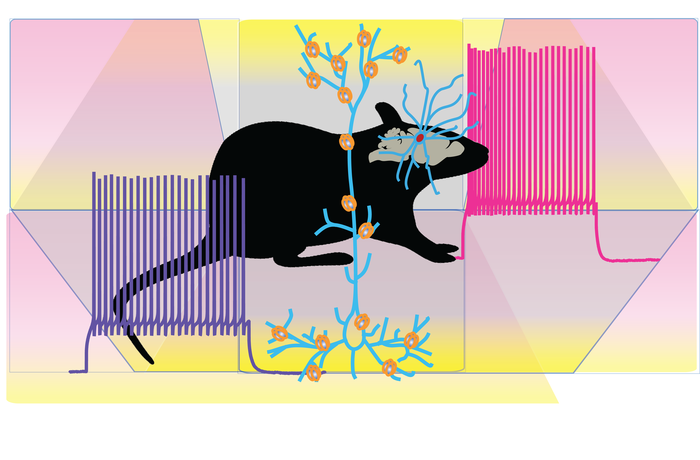Kyoto, Japan — A new study reports that immune cell responses to bacteria affect the intrinsic excitability of rat neuronal subtypes differently. The findings have implications for neural network control, including irregularities that lead to neurological and psychiatric disorders.

Credit: KyotoU
Kyoto, Japan — A new study reports that immune cell responses to bacteria affect the intrinsic excitability of rat neuronal subtypes differently. The findings have implications for neural network control, including irregularities that lead to neurological and psychiatric disorders.
If a neuron can be viewed as a battery that stores and discharges electricity, then its intrinsic excitability can be viewed as the battery’s storage capacity. While higher energy storage is usually viewed positively, overcharging a battery could cause it to overheat and become damaged.
Like all immune cells, microglia serve to kill off pathogens and infections, and their activity is known to regulate the intrinsic excitability of neurons. Yet, when microglia are over-stimulated, they can cause inflammation, pain, and other ailments.
“For example, unmanaged intrinsic excitability has been attributed to psychiatric diseases, like mood disorders,” explains author Gen Ohtsuki of Kyoto University.
Current knowledge on neuronal regulation comes from experiments analyzing Purkinje cells. These neurons are found in the cerebellum, which is considered an evolutionarily ancient part of the brain and responsible for motor control. Less understood are the effects on the intrinsic excitability of pyramidal cells, which are neurons found in the cortex: the part of the brain associated with higher-level thinking.
The team observed that calcium-activated SK ion channels in pyramidal cells were modulated by microglia, which is the same for Purkinje cells. However, in pyramidal cells, SK channels were upregulated, while they were downregulated in Purkinje cells.
“The effects were completely opposite,” notes Ohtsuki.
The pyramidal cells appeared to react to the same cytokine — TNFa or tumor necrosis factor alpha — secreted by activated microglia: one of the most common cytokines released by immune cells in response to an infection.
However, the difference in SK channel regulation resulted in lower intrinsic excitability of pyramidal cells but higher intrinsic excitability of Purkinje cells. These inverted responses or directionalities to the same input are not uncommon between Purkinje and pyramidal cells and have also been seen with synaptic plasticity.
Ohtsuki cautions that: “The effects of microglia in one part of the brain should not be generalized to the entire organ. Our findings show that we need to study different brain regions separately to understand how microglia regulate neuronal function and how immunity impairs plasticity of neurons in psychiatric-diseased brains.”
###
The paper “Microglia-triggered hypoexcitability plasticity of pyramidal neurons in the rat medial prefrontal cortex” appeared 5 February 2022 in Current Research in Neurobiology, with doi: 10.1016/j.crneur.2022.100028
About Kyoto University
Kyoto University is one of Japan and Asia’s premier research institutions, founded in 1897 and responsible for producing numerous Nobel laureates and winners of other prestigious international prizes. A broad curriculum across the arts and sciences at both undergraduate and graduate levels is complemented by numerous research centers, as well as facilities and offices around Japan and the world. For more information please see: http://www.kyoto-u.ac.jp/en
Journal
Current Research in Neurobiology
DOI
10.1016/j.crneur.2022.100028
Method of Research
Experimental study
Subject of Research
Cells
Article Title
Microglia-triggered hypoexcitability plasticity of pyramidal neurons in the rat medial prefrontal cortex
Article Publication Date
5-Feb-2022
COI Statement
The authors declare there are no conflicts of interest.




